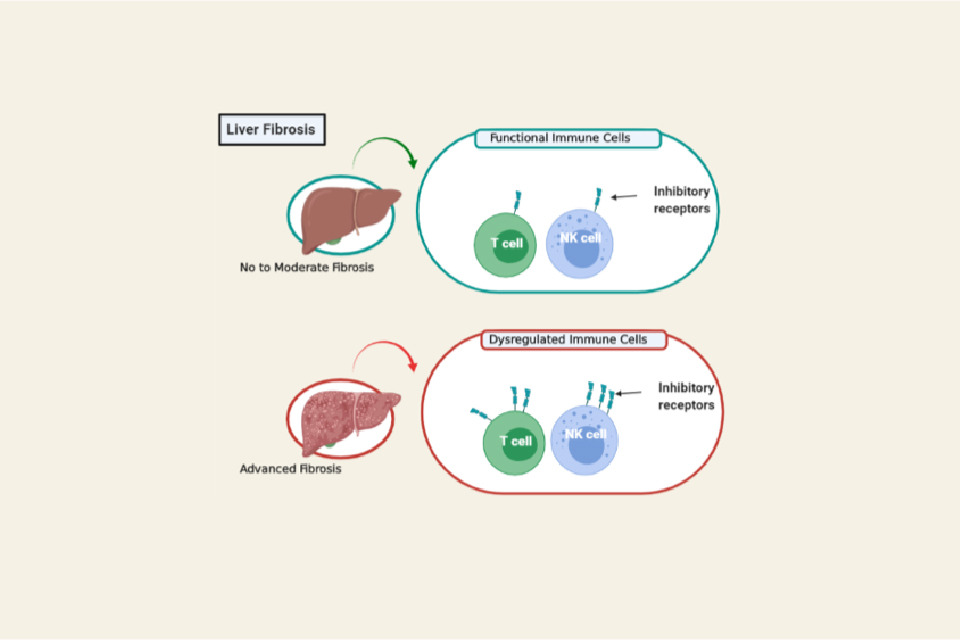Upon picking up Born a Crime – comedian Trevor Noah’s book about growing up in racially segregated South Africa – Chisom Okwor, an international graduate student from Nigeria, was struck with inspiration. Just as Trevor Noah shed light on inequalities through comedy and storytelling, Ms. Okwor, a student in the Department of Biochemistry, Microbiology and Immunology, wanted to leverage science to do the same. With this clear vision, her focus shifted towards infectious diseases with inequitable health outcomes, particularly hepatitis C virus (HCV).
HCV is the leading cause of liver cancer. According to data collected by the Public Health Agency of Canada, in 2017, a total of 11,592 cases of Hepatitis C were reported nationwide, corresponding to a rate of 31.7 per 100,000 people.
Although life-saving treatments have existed since the1990s, HCV continues to disproportionately affect minority groups including injection drug users, federal prisoners, and foreign-born populations. Ms. Okwor is determined to challenge the status quo and dedicate herself to equitable health outcomes.
With a cutting-edge infectious diseases facility at uOttawa’s Faculty of Medicine, Ms. Okwor did not have to look far to find a world-leading HCV researcher in Dr. Seung-Hwan Lee, associate professor in the Department of Biochemistry, Microbiology and Immunology. In a collaborative effort with Dr. Curtis Cooper, Director of The Ottawa Hospital and Regional Hepatitis Program and associate professor in the Department of Medicine — and with generous support from the Canadian Network on Hepatitis C (CanHepC) — Ms. Okwor had the foundation she needed to start pipetting her vision into reality.
Plunging into her Master’s studies, Ms. Okwor sought to uncover the immunological cause of poor clinical outcomes for HCV-infected patients with advanced liver damage. Compared to patients with less severe liver damage, these patients were at higher risk for primary liver cancer and other viral infections.
“[These patients] have a weakened immune system or have a worse immune response than those that have less liver damage,” Ms. Okwor explains.
Recently, Ms. Okwor and her colleagues published a paper that shed light on this problem. By focusing on immune cells from patient samples, they discovered that immune dysregulation in patients with advanced liver damage resulted from higher levels of inhibitory receptors. These receptors were found to be on the surface of immune cell types, known as T and Natural Killer (NK) cells, important for eliminating cancer cells in the body. This novel finding provides a strong foundation for the development of targeted therapies to improve these patients’ immune function.
Ms. Okwor remarks that although this research is far from complete, "just being able to help these populations, I think, is one of the best parts of working with HCV.” This dedication, along with her translational scientific findings, won her the Best Oral Presentation award at the 2020 Virtual Faculty of Medicine Research Day.
Ms. Okwor owes her success to the continuous support she has received from her parents, her Master’s degree supervisor Dr. Lee, and her undergraduate research supervisor and role model Dr. Ewurabena Simpson, a Black hematologist/oncologist at CHEO and assistant professor in the Department of Pediatrics.
Reflecting on the importance of Black professionals' representation in her own academic experience, Ms. Okwor found it empowering to leverage her own success in mentoring younger Black students. "I want to show them that people like them are doing things like this," she notes.
As Trevor Noah once said: “We tell people to follow their dreams, but you can only dream of what you can imagine, and, depending on where you come from, your imagination can be quite limited.” Looking into the future, Ms. Okwor hopes to continue striving for better outcomes for all members of society as a medical professional while inspiring the next generation of physicians and scientists, particularly women of colour.
Saif Dababneh and Emran Alnahhas are students in the Honours Bachelor of Science Program in Translational and Molecular Medicine. They wrote this story originally for their 4th year Science Communications course as part of a series profiling researchers at the Faculty of Medicine.
The course is designed and taught by Dr. Kristin Baetz, interim assistant dean, research and special projects and professor in the Department of Biochemistry, Microbiology and Immunology, to foster in students the ability to convey complex science to a lay audience – an essential skill when making presentations, applying for grants, composing abstracts for research papers and generally communicating one’s work in the biomedical sciences.
MedPoint will be publishing profiles from this series throughout 2021.

